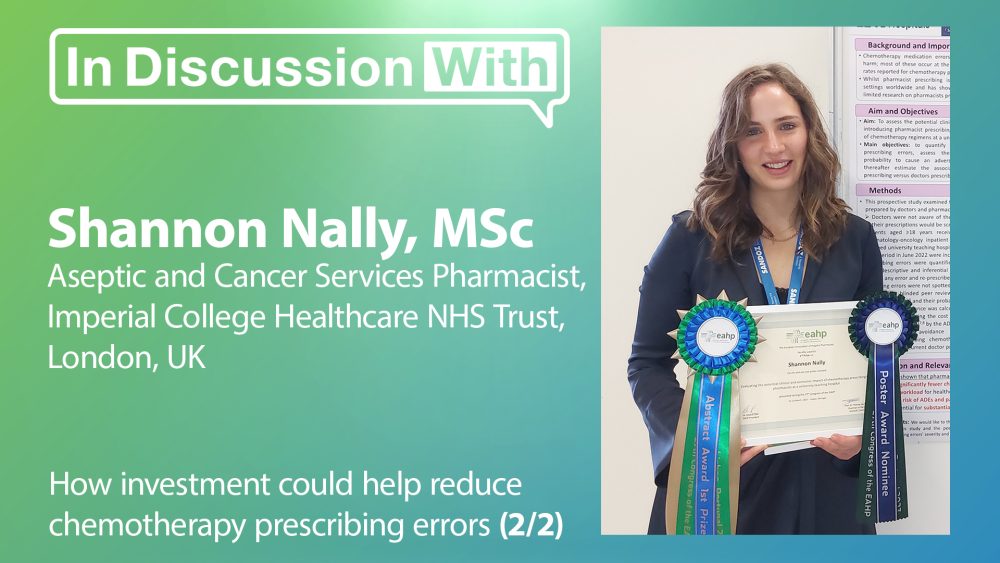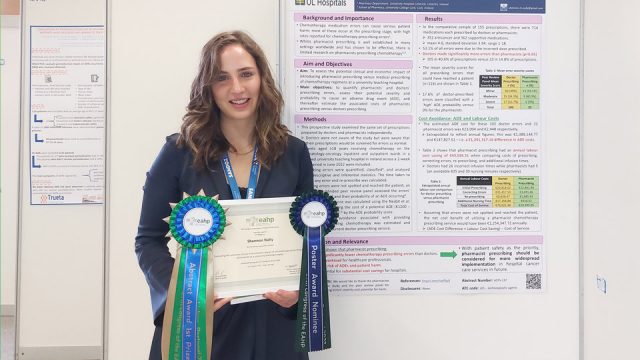Advertisment
How investment could help reduce chemotherapy prescribing errors

Chemotherapy prescribing is an “error-prone process” according to Shannon Nally, the author of a study conducted at University Hospital, Limerick. The findings suggest that prescribing of chemotherapy by pharmacists could reduce errors and costs.

Of the 124 prescribing errors recorded in this study 17 were classified as ‘severe’ by the independent panel of reviewers. Examples include:
- One patient who was prescribed weekly paclitaxel while she was waiting for pathology results. When the results arrived, they showed HER2-positive breast cancer for which trastuzumab and pertuzumab should have been prescribed. Failure to prescribe these agents for this patient could have compromised the success of the breast cancer treatment, comments Ms Nally.
- A patient with colon cancer was prescribed a “totally different” regimen that is normally used for pancreatic cancer.
- A patient was prescribed carboplatin 810 mg “but based on their renal function the dose should have been 600 mg – so this is a 35 percent overdose”, says Ms Nally.
Both severity scores and the ‘probability of adverse drug events’ were reported. The probability score indicates the probability of causing an adverse drug reaction (ADE) if the error reached the patient and the severity score indicated how severe an ADE would be if it reached the patient.
The economic evaluation included both labour costs and the costs of an ADE. “We calculated the time it took to correct any error and re-prescribe it because when a prescribing error is made it adds to the workload of both the doctor and the pharmacist. The pharmacists must start correcting the prescription – they realise there’s an error, they must phone up the doctor, communicate it to them, the doctor then in turn must re-prescribe his prescription, it’s sent back to the pharmacist, they recheck it – so this is an extra few steps in the cycle. So, all labour costs associated with that error were calculated”, explains Ms Nally. Only senior doctors (registrar, specialist registrar (SpR) or consultant) are permitted to prescribe, she adds.
The average time to write a prescription was about four minutes for both pharmacists and doctors. However, doctors often prescribed longer infusion times than pharmacists resulting in avoidable increases in the nurse time required for administration. “The doctors prescribed an additional 835 nursing minutes compared to [an additional] 30 minutes by pharmacists. To put this into context – a doctor or a pharmacist could have prescribed pembrolizumab [to be administered] over an hour when you can actually give it over 30 minutes. So, these 30 minutes of additional nursing time comes with an extra cost for the nurse, ……. so these prolonged infusion times contribute to prolonged patient stays and reduce the capacity of our day wards”, says Ms Nally.
In order to determine whether the implementation of a pharmacist prescribing service would be beneficial in terms of cost avoidance for the hospital, a cost analysis was performed using the method described by Gallagher and colleagues. This was based on the assumption that all errors actually reached the patients i.e. that the screening pharmacist failed to identify and intercept the errors.
“So, in terms of cost avoidance to the hospital, a yearly net cost benefit of over 1.2 million Euro and a cost-benefit ratio of nearly 42 Euro was calculated based on the provision of a pharmacist chemotherapy prescribing service”, says Ms Nally.
Why do errors occur?
“No doctor or [prescribing] pharmacist sets out to make errors, they’re all unintentional – it’s human nature. But, as a hospital group and at a management level we need to have systems in place to eradicate and minimize patient harm. We know that medication errors cause a significant amount of injury and preventable harm in health care systems around the world and the World Health Organization (WHO) has reported [that] the cost of medication errors is [about] 42 billion USD annually”, says Ms Nally. In addition, factors including overburdened healthcare systems, polypharmacy, complex patient groups and inexperienced doctors prescribing add to the risks of prescribing. Chemotherapy represents a substantial risk because of a number of factors including patient vulnerability, complex treatment regimens, drugs with narrow therapeutic indices and frequent parenteral administration. “It makes the prescribing of chemotherapy an error-prone process”, emphasises Ms Nally.
In this study, the doctors were prescribing for patients in the normal way, whereas for the pharmacists involved it was a hypothetical exercise. Moreover, the doctors were unaware that the study was taking place. “Now the normal practice is that their prescriptions are screened by pharmacists – so pharmacists will always check their work regardless of pharmacist prescribing – so the doctors are always conscious that we as pharmacists check their work”, says Ms Nally. “In our hospital, the guidelines are that only senior doctors can prescribe so [the doctors involved] were well-versed, experienced doctors”, she adds.
This study has shown that pharmacist-prescribing and better used of our expert skill set results in significantly fewer chemotherapy prescribing errors than doctors; it minimises workload for healthcare professionals; we reduce the risk of adverse drug reactions and patient harm and it has the potential for substantial cost savings for our hospitals. Most importantly, it improves patient safety and therefore this is ultimately why this initiative ….. should be considered for implementation in cancer care services on a much wider scale , Ms Nally concludes.
Shannon Nally is now Aseptic and Cancer Services Pharmacist at Imperial College Healthcare NHS Trust.
The poster: Evaluating the potential clinical and economic impact of chemotherapy prescribing by pharmacists at a university teaching hospital was selected as Best Poster at the EAHP Congress held in Lisbon, Portugal 22-24th March 2023.
Read and watch the full series on our website or on YouTube.





